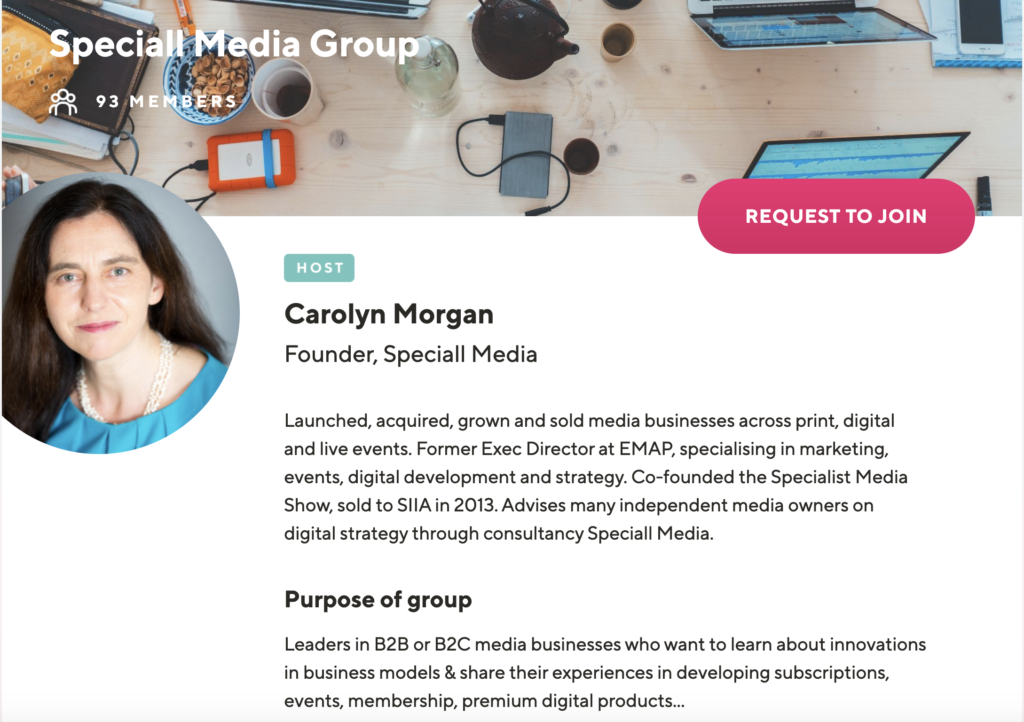At our first Speciall Media Group virtual round table in mid January, fifteen leaders of independent consumer and business publishers shared their experiences on three hot topics. While respecting their anonymity, I have summarised the top takeaways.
Paywalls and digital subs
Many previously free publications have recently embarked on registration and pay walls online, some also bundling in print magazines. Here’s the key learnings that were shared.
- On a metered model, publishers often start with a high number of stories per month, (eg 15) but end up reducing to 5 or 7 a month as they build confidence.
- It’s a long game; it will take readers time to convert and for publishers to tweak the meter and pricing
- Test lots of marketing approaches: content marketing, price offers
- Early days for one niche publisher, but so far about 10% of registered users signed up to paid subs, advertising remained buoyant and 10% revenue now subs.
- Try strong offers, eg £2 a month, especially in a market where competitors publish for free. Consider different pricing for different segments of audience
- In public sector, some have had success with a hard paywall, no free articles
- Invest time in researching customers to find out what they truly value
- If your content is exclusive or unique you can price boldly. Some publishers can charge up to £1000pa for an individual
B2B communities
Many event organisers and publishers are keen to nurture a professional community of their customers, but this is not a short-term fix, and there are many pitfalls. These were the key points shared:
- It takes time to build trust and create a community – and senior people have to get involved
- Communities are not just about content – publishers can fall into the trap of thinking them as another place to spam their content.
- Have a clear purpose – why should a member join and invest time?
- In B2B it’s about quality and engagement, rather than big numbers of members
- Need a good host as people won’t start chatting on their own. Take the time to welcome, chat and thank, as well as encouraging discussion
- Attendees at a live event are not automatically a community – this has to be nurtured
- Communities can add value to paying subscribers or members, building engagement and retention.
- Engaged community members are more likely to volunteer to be an awards judge, to speak, to get involved in research; adding value to the host business
- Be aware some industries/ disciplines are more chatty and willing to share, and others are more reticent – know your audience. Might also prefer different times of day to engage
- Once a community has its own experts the host is just a facilitator
- Publishers who have a content site and fragmented community activity on Linked In, YouTube etc face challenges bringing it all together in one place.
Remote teams
The pandemic forced remote working on media businesses, but they are unlikely to go back to former working patterns. These are some of the tactics one niche media business used to survive the crisis and grow revenues without making any redundancies. Plus some pointers for the future.
- Consider tweaking contracts, KPIs, salary, bonus to company level targets – to encourage support and cross team working while remote. In one case, salaries were set at a minimum level (60-80% of full salary) and staff could earn the top-up if revenue targets were hit. [Spoiler – they were!]
- Ensure all have the tech kit and an environment to work effectively at home. Have the software to support ability to easily share info, access data, set up meetings
- Create structure with virtual meetings to replace informal conversations: Show and tell town halls, daily team meetings each morning, cross team project info sharing, social quizzes/ fun, company awards
- CEO to set aside 1:1 time with all staff – an hour a quarter, find out their domestic challenges, how best to motivate, wellbeing issues
- Wellbeing: encourage exercise, daily walk outdoors, group challenges like walking around Britain, allow flexitime (with core hours for meetings), self evaluation surveys, support networks, parents network
- Flexible pay package – company targets, pension holidays, flexible holidays
- May be hard to manage the return to hybrid, office and virtual later in 2021. Demographic split between older groups happy to home work, younger groups want office for social support. Decide your plan – reduced office space, structured team days in person
- Challenging for new recruits – need to be closer to office so can meet in person. Maybe use trade shows (once back) to get teams together.
Speciall Media Group
This round table was a good opportunity to have intense discussions with senior leaders in specialist media businesses, learn new ideas and form new connections. Attendees were drawn from the Speciall Media Group, an online community run by Carolyn Morgan. Membership is limited to senior media owners, no suppliers or services. If you’d like to request to join the group, this is the link.
About the author
Carolyn Morgan has bought, sold, launched and grown specialist media businesses across print, digital and live events. A founder of the Specialist Media Show (sold in 2014) she now advises media businesses large and small on their digital strategy through her consultancy Speciall Media.

